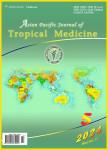Intention of healthcare workers to accept COVID-19 vaccination and related factors:A systematic review and meta-analysis
作者机构:Clinical Epidemiology LaboratoryFaculty of NursingSchool of Health SciencesNational and Kapodistrian University of AthensGreece Department of RadiologyP&A Kyriakou Children's HospitalGreece Hospital Waste Management UnitP&A Kyriakou Children's HospitalGreece Center for Health Services Management and EvaluationFaculty of NursingSchool of Health SciencesNational and Kapodistrian University of AthensGreece
出 版 物:《Asian Pacific Journal of Tropical Medicine》 (亚太热带医药杂志(英文版))
年 卷 期:2021年第14卷第12期
页 面:543-554页
核心收录:
学科分类:1004[医学-公共卫生与预防医学(可授医学、理学学位)] 1002[医学-临床医学] 100401[医学-流行病与卫生统计学] 10[医学]
主 题:COVID-19 Vaccination Healthcare workers Intention SARS-CoV-2
摘 要:Considering medical and economic burden of coronavirus disease 2019(COVID-19), a high COVID-19 vaccination coverage among healthcare workers(HCWs) is an urgent need. The aim of this systematic review and meta-analysis was to evaluate the intention of HCWs to accept COVID-19 vaccination and to identify related factors. We searched Pub Med, MEDLINE, Scopus, Web of Science, Pro Quest, CINAHL and med Rxiv until July 14, 2021. The heterogeneity between results was very high;thus, we applied a random effects model to estimate pooled effects. We performed subgroup and meta-regression analysis to identify possible resources of heterogeneity. Twenty four studies, including 50 940 HCWs, met the inclusion criteria. The overall proportion of HCWs that intend to accept COVID-19 vaccination was 63.5%(95% confidence interval: 56.5%-70.2%) with a wide range among studies from 27.7% to 90.1%. The following factors were associated with increased HCWs’ willingness to get vaccinated against COVID-19: male gender, older age, white HCWs, physician profession, higher education level, comorbidity among HCWs, vaccination against flu during previous season, stronger vaccine confidence, positive attitude towards a COVID-19 vaccine, fear about COVID-19, individual perceived risk about COVID-19, and contact with suspected or confirmed COVID-19 patients. The reluctance of HCWs to vaccinate against COVID-19 could diminish the trust of individuals and trigger a ripple effect in the general public. Since vaccination is a complex behavior, understanding the way that HCWs take the decision to accept or refuse COVID-19 vaccination will give us the opportunity to develop the appropriate interventions to increase COVID-19 vaccination uptake.



